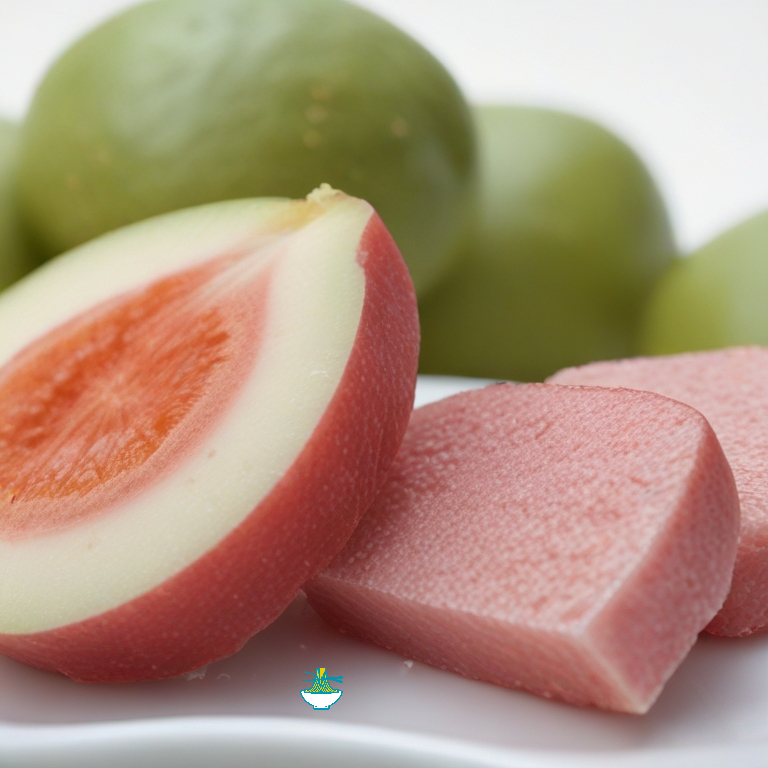Indulge in the exotic allure of the Caribbean with our Grenada Guava Cheese, a delectable fusion of sweet guava and creamy cheese. Handcrafted with care and expertise, each bite unveils a harmonious blend of tangy guava and rich cheese, evoking the vibrant flavors of Grenada's tropical landscape. Whether enjoyed on its own as a delightful snack or paired with crackers for a sophisticated appetizer, our Grenada Guava Cheese promises a tantalizing journey for your taste buds. Savor the taste of paradise with every heavenly bite.
Here's a recipe for Grenada Guava Cheese:
Ingredients:
- 2 cups guava pulp (fresh or canned)
- 1 cup granulated sugar
- 1 tablespoon lemon juice
- 1 teaspoon vanilla extract
- Butter or non-stick cooking spray for greasing

Instructions:
1- Prepare the guava pulp by removing the seeds and blending the flesh until smooth. If using canned guava pulp, ensure it's strained to remove any seeds or fibers.
2- In a heavy-bottomed saucepan, combine the guava pulp, sugar, and lemon juice over medium heat. Stir continuously until the sugar has dissolved completely.
3- Once the sugar has dissolved, reduce the heat to low and continue cooking the mixture, stirring frequently to prevent burning. The mixture will start to thicken and reduce in volume.
4- Cook the mixture for about 30-40 minutes, or until it reaches a thick, spreadable consistency similar to jam. To test the readiness, you can drop a small amount onto a plate and see if it holds its shape without spreading too much.
5- Once the mixture has thickened, remove the saucepan from the heat and stir in the vanilla extract.
6- Lightly grease a shallow dish or baking tray with butter or non-stick cooking spray. Transfer the guava mixture into the greased dish, spreading it evenly with a spatula.
7- Allow the guava mixture to cool and set at room temperature for a few hours, or refrigerate for faster setting.
8- Once set, carefully cut the guava cheese into desired shapes, such as squares or rectangles.
9- Serve the Grenada Guava Cheese as a sweet treat or dessert, either on its own or paired with crackers, cheese, or bread.
10- Store any leftovers in an airtight container in the refrigerator for up to a week.
Enjoy the sweet and tangy flavors of this delightful Grenadian confection!
Nutritional Values:
Here's an approximate nutritional breakdown for the ingredients used in the Grenada Guava Cheese recipe:
Guava pulp (2 cups):
- Calories: 180
- Carbohydrates: 46 grams
- Fiber: 6 grams
- Sugars: 26 grams
- Protein: 3 grams
- Fat: 1 gram
- Vitamin C: 498 milligrams
- Vitamin A: 1500 IU
- Potassium: 688 milligrams
benefits:
- Rich source of vitamin C, which supports immune function and skin health.
- Contains dietary fiber, aiding digestion and promoting gut health.
- Provides vitamin A, important for vision and skin health.
- High in antioxidants, helping to protect cells from damage caused by free radicals.
Granulated sugar (1 cup):
- Calories: 774
- Carbohydrates: 200 grams
- Sugars: 200 grams
benefits:
- Provides a quick source of energy.
- Adds sweetness and enhances flavor in recipes.
- Used as a preservative in jams and preserves.
Lemon juice (1 tablespoon):
- Calories: 4
- Carbohydrates: 1 gram
- Sugars: 0.1 grams
- Vitamin C: 7.9 milligrams
benefits:
- Excellent source of vitamin C, boosting immune function and promoting skin health.
- Contains citric acid, aiding in digestion and detoxification.
- Adds a tangy flavor to recipes and balances sweetness.
Vanilla extract (1 teaspoon):
- Calories: 12
- Carbohydrates: 0.6 grams
- Sugars: 0.6 grams
benefits:
- Enhances flavor and aroma in recipes.
- Contains antioxidants with potential health benefits.
- May have calming effects and help reduce anxiety.
Please note that these values are approximate and may vary based on factors such as brand, specific ingredients used, and preparation methods.


Comments